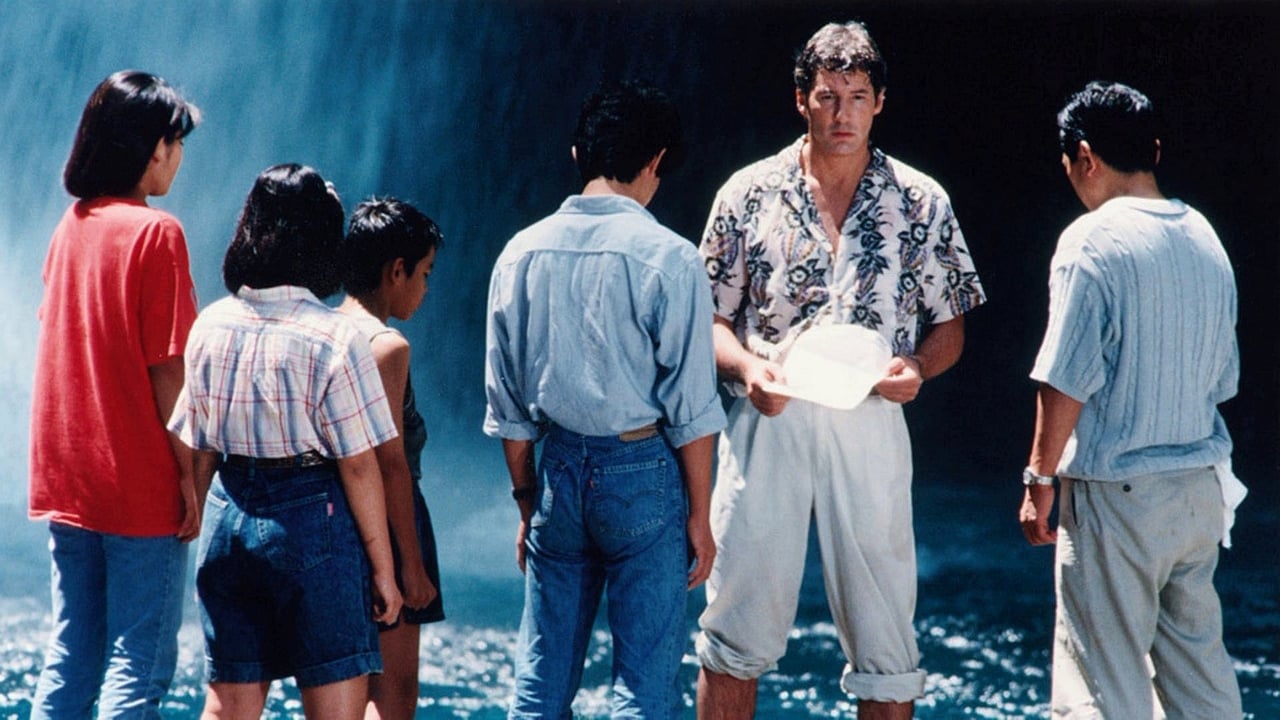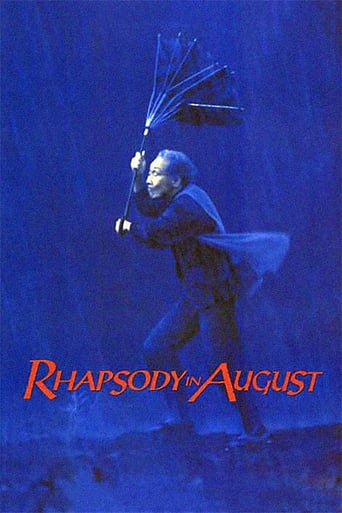



everything you have heard about this movie is true.
View MoreAbsolutely the worst movie.
Too much about the plot just didn't add up, the writing was bad, some of the scenes were cringey and awkward,
View MoreIt is interesting even when nothing much happens, which is for most of its 3-hour running time. Read full review
View MoreRhapsody in August is a very small movie. It has little of Kurosawa's bravura cinematic flare and could well, from its look, have been made for television. Yet there is something rather lovely about this little thing.The movie is about children staying with their grandmother who learn that she has a brother living in America. She doesn't remember this brother, one of many siblings, some dead, and the children, eager for a trip to California, try and encourage her to remember.The grandma is lovely. The children seemed a bit unconvincing, speaking in stiff conversations and sometimes over-emoting, but maybe that's what children are like in Japan.The grandma lives near Nagasaki, where she lost her husband, and the children do some downbeat sightseeing.When I read user reviews of this movie, several were mainly just a description of the story, and I seem to be doing the same thing. I'm not sure what it is about this movie that makes one want to tell what happens, since really, not much does. It's an episodic film that is notable not for story but for lovely, quiet moments like the survivors of a school carefully tending the twisted jungle gym left as a memorial.Perhaps one wants to tell the story because the movie is made up of little moments, like a search for a mysterious tree or ants crawling to a rose, that don't on their own seem to mean much and yet in the context of the film are striking.There is something wandering about the movie, although since life does wander this may be a feature rather than a bug. Like the reviewers here, I don't know what to make of the final, overlong scene, and I would have preferred something else. But I am glad I saw this.
View Morewhen i compare this movie to other movies from Kurosawa, it is not one of his best. but though its still a good movie, and i enjoyed it. when i watched it, it "sucked" me into it, in the way a good book does it. i like how Kurosawa is setting the focus on the bombing of Nagasaki, without overdoing it. without the use of sad/touching music and heroic speeches (like it is used in other movies touching sad historic moments), you can feel the grief over the bombing. i also like the acting of especially the Japanese cast, Gere's character is a bit to playful, but all in all, all right. so all in all, i think that the movie is worth watching. it is shot beautiful, and it has an interesting and solid story.
View MoreThis film feels like a story the great Akira Kurosawa wanted to tell. Four grandchildren are staying with their aged grandma outside of Nagasaki. She is a survivor of the bomb in 1945, but her husband, a teacher, perished that day. The grandmother's children are in Hawaii visiting a relative and her husband, who is played by Richard Gere in a fine understated performance. Clark (Gere) and his wife have her father living with them, and they claim he is one of Grandma's brothers, but she cannot remember him. The film becomes a mediation on the war, specifically the devastating effect on Nagasaki. In one particularly touching scene everyone gathers at the school where Grandpa perished that day in August. There is a monument there built for the children who dies there that day, a sculpture of mangled monkey bars. The film is slow moving, meditative, but moving in its best moments. While not among Kurosawa's best work (its virtually impossible to stand up to such greatness), this last film of his is a touching tribute to a part of his life (and so many others) that is both easy to forget, but also impossible not to remember. The acting is uniformly very good, especially the four children and Grandma. Recommended.
View MoreAkira Kurosawa, in the twilight of his career, turned his attention to a quiet study of lingering wartime trauma, showing different generations of Japanese civilians recalling the atom bombing of Nagasaki, with varying degrees of shame, understanding, and curiosity. By coincidence the film opened just after the 50-year anniversary of the attack on Pearl Harbor, but Kurosawa isn't interested in scratching old war wounds, and his characters show more envy than hatred of Western culture: note how the jeans and t-shirts worn by the younger kids are always colored in some combination of red, white and blue. But the story is too polite to generate anything resembling a conflict, and the occasional profound image (a rose in full bloom, surrounded by ants) may not be enough to hold the viewer's attention through the final credits. Late in life, Kurosawa the artist gave way to Kurosawa the messenger, and the result here is another mild disappointment from an acknowledged master filmmaker resting on his laurels: heartfelt and certainly respectable, but too often rarely more than simply dull.
View More